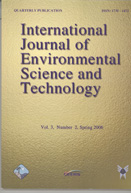
|
International Journal of Environment Science and Technology
Center for Environment and Energy Research and Studies (CEERS)
ISSN: 1735-1472
EISSN: 1735-1472
Vol. 12, No. 6, 2015, pp. 2065-2070
|
 Bioline Code: st15192
Bioline Code: st15192
Full paper language: English
Document type: Research Article
Document available free of charge
|
|
|
International Journal of Environment Science and Technology, Vol. 12, No. 6, 2015, pp. 2065-2070
| en |
Mitigation of arsenic in rice through deficit irrigation in field and use of filtered water in kitchen
Basu, B.; Kundu, M.; Hedayatullah, Md.; Kundu, C. K.; Bandyopadhyay, P.; Bhattacharya, K. & Sarkar, S.
Abstract
An experiment was conducted in an arsenicaffected
area of West Bengal, India, with the aim of alleviating
arsenic toxicity from food chain through water
management in rice field and modification of cooking
procedure of the same grain in kitchen. Three regimes of
deficit irrigation, viz. intermittent ponding, saturation and
aerobic condition were tested in field against continuous
ponding, i.e. local farmers’ practice. Produced grains were
cooked in traditional method with both arsenic-contaminated
and filtered water. Results revealed that deficit irrigation
can be efficiently used to reduce the arsenic load in
rice grain. Water management in field can reduce 9–21 %
arsenic content in raw rice grain and can save 150–340 mm
of irrigation water over traditional cultivation procedure.
Furthermore, use of filtered water for cooking can alleviate
up to 32 % of arsenic. The study also revealed that growing
rice under deficit irrigation can also increase the water use
efficiency of the crop.
Keywords
Aerobic culture; Cooking procedure; Dietary exposure; Food chain; Intermittent ponding; Water management
|
| |
© Copyright 2015 - International Journal of Environment Science and Technology
Alternative site location: http://www.ijest.org
|
|
